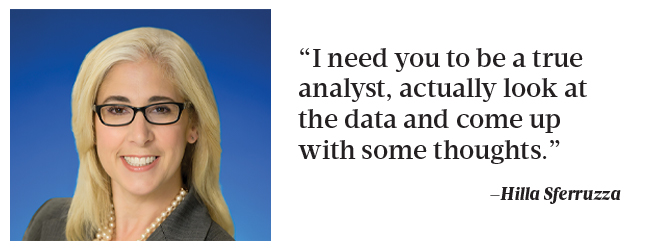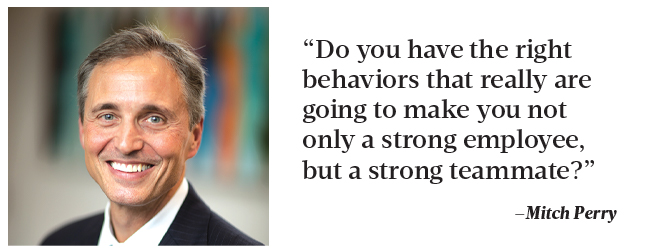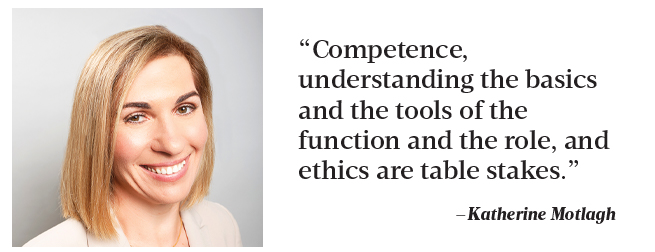Organizations that are successful over the long haul prioritize attracting and cultivating high-potential entry-level employees to stock their talent pipeline and help inexperienced accounting and finance team members to blossom into experienced contributors. Katherine Motlagh, CFO of CyrusOne; Hilla Sferruzza, CFO of Meritage Homes; and Mitch Perry, CFO of Blue Cross and Blue Shield of North Carolina, reveal what they look for when interviewing candidates and offer professional development advice for both employers and entry-level employees.
SF: What skills are you looking for in new hires?
Motlagh: When we consider hires for our finance organization, we’re looking for diversity, flexibility, and a positive attitude. It’s very important for the younger generation to be eager to learn and to have the appetite and initiative to go the extra mile. Both verbal and nonverbal communication skills are very important for all roles.
You have to be able to sell yourself during the interview and clearly convey the message of why you want to join CyrusOne. So candidates need to pay attention to communication. We look for our new hires to be adaptable and agile in an ever-changing environment. Multitasking is important but not at the expense of the details; it’s important to be able to manage multiple priorities but also stay focused.
We look for goal-oriented people who are eager to be on our team to achieve results; we want them to be focused, learn as much as they can, and do more in the future. Teamwork is also important. We look for people who work well with others, put team first, and value collaboration. When we look at younger hires, we look for initiative, somebody who is taking that step forward on their own, who thinks creatively and critically, and who looks for solutions rather than problems. So when I interview people, I’d like to hear examples of when they were faced with a problem and how they came up with a solution. I look for the combination of problem-solving skills, communication, and initiative.
Competence, understanding the basics and the tools of the function and the role, and ethics are table stakes. Last but not least, a mind-set of innovation for our new hires is very important—not just technology innovation, but also process innovation, tools innovation, approach innovation, any kind of innovation.

Sferruzza: If we’re looking for new hires, graduates, or entry-level positions in finance and accounting, and it applies to IT as well, the college degree is important because it shows that you have the dedication to learn and that you have a passion for that chosen area, but the skill set that I’m really looking for is the desire to learn more. We want folks who have a passionate interest about what they’re doing. Ask a lot of questions. Even in an entry-level position, I want you to challenge the status quo, not aggressively, but it always makes me nervous when people come into a new role right out of college and they have no questions. That’s impossible. Being curious is my number-one skill set, along with a high level of proficiency or a comfort level with technology. If you’re coming into the accounting and finance profession, I expect you to be an Excel and database wiz, so that’s the baseline.
So much of our world is interconnected in business, so soup to nuts, we have a whole bunch of systems that all talk to one another, whether it’s the accounting system, the treasury system, the forecasting system, even our CRM [customer relationship management] tool, we use Salesforce, so even our sales tools, they’re all interconnected. You have to be comfortable with technology or at least be willing to learn how it all comes together because the really successful candidates are going to be able to utilize that technology and make it work for them; make their work faster, smarter, better; and hopefully teach some of us that have been here for a little while some neat tips and tricks.
My favorite part of the day is when I work with our younger team members and I ask them to complete a task that I think is going to take them a day or two, but I get back to my desk and it’s already done and in my inbox. And it isn’t that they have stronger technical skills. It isn’t that they understand financial modeling better. They just know how to extract the data from the systems that we have, run it through a filter, and get the data much quicker.

Perry: Technical skills, understanding financial concepts, not being afraid to get around the financial statements, analytical skills, and the ability to use technology are important. Quite frankly, it comes down more to cultural fit, which new employees and the company think a lot about and should really consider when they’re making their choice. We think about, “Is this the type of environment where we think the person will thrive? Do you think they’d be a good teammate? Will they make others better?” So we view the technical skills largely as a baseline. One of the most critical things is: Do you have the right behaviors that really are going to make you not only a strong employee, but a strong teammate—a desire to learn, being curious, thinking about, “How can I make the place better?” Having a sense of humility and the openness to learn but also being willing to engage broadly and having the sense of urgency to really jump in.
Are you willing and able to communicate in multiple settings? Are you willing to accept and give feedback in meaningful ways? Can you problem-solve? All those things are much more critical than the core technical skills when we’re thinking about the types of employees that are going to be a great fit not only for the near term, but for the long term of our company.
SF: How has technology changed the role of the finance function, and how does that change what you look for in entry-level staff?
Sferruzza: It changed absolutely everything. Back in the day, when you came out of school, a big chunk of your job would just be pencil-whipping data. People wanted you to pull certain information together and you would spend a ton of time trying to cull the data together and then give it to someone else, and then that smart person did some analysis on it. Now technology does all of that for you. I don’t need you to filter data for me; the system does it by itself. Even for new-hire positions, folks that are just entering the job market, the data is available; so now I need you to be a true analyst, actually look at the data and come up with some thoughts, solutions, opportunities, conclusions, and at least a preliminary understanding. In the past, finance folks were data aggregators, but now they’re true analysts because the data aggregation part of the job is all automated. So we’re looking much earlier now for those analytical skills that previously developed later in a career.

Motlagh: We’re in the data-center business, so our world evolves around technology, but we also are a real-estate company. New hires need to have that mind-set and ability to understand that you have physical and virtual interactions. We still work from home these days, we use collaborative information-sharing online tools, and we’ve changed the ways we share, store, and update documents. We have evolved even in the last 12 months during the pandemic in how we do business, and that highlighted the need for flexibility. But more importantly, we need talent that understands that technology will continue to evolve faster and be more impactful as we learn to use it and process data more efficiently. So how we apply that technology and how we learn and adapt the technology to move our business forward are the most important keys to success in our space.
Perry: Not only has technology changed it, but the enormous amount of data and the ability to harness that data have significantly changed the function. When I started in finance, quite frankly, finance was viewed as more of a shared service or a back-office function, and we were the experts that made certain that the books were right. Sometimes financial statements would just be presented to the executives in the form that came straight off the system. With all the technology and access to the myriad of data that has to be brought together, the finance function has become digital guardians for the company. We’ve really come from the back office to the forefront. I can’t think of much of anything that happens at our company that our finance team isn’t in the center of. We’re viewed as the group that’s able to navigate through a tremendous amount of data.
Think about not only the financial data, but also operational data, customer data, and clinical data. Finance must provide that single source of truth for the organization and be at the center of helping our business leaders formulate strategy, gain insights, and drive that strategy so that we can deliver financial and business value for our customers. It’s a high-trust, high-expectation environment for finance and an exciting time and place to be coming into it. So what does that mean for how we think about our talent and skills?
It goes a back to behaviors and how employees are able to help us navigate and use technology to make things as streamlined as possible so that it can provide the insights we want. Understanding and automating both accounting and system controls are critical. Failure in controls can distract you from what you need to be paying attention to and prevent you from driving the business forward. Being able to automate as many of those controls as possible and actually finding ways to get at the data as seamlessly as possible enable [personnel] to spend as much time as possible focusing on insights and driving value and outcomes.
Having a good understanding of how to do multidata modeling can help business leaders think through scenarios and what impacts could occur. Having a good understanding of the business is key; it’s very difficult to truly be a valued business partner if you don’t understand the business. It isn’t enough to understand just the financial information; you’ve got to understand how our customers think. What do they expect or need? What’s important to them? How do I actually look at the data that comes from the customer in the marketing side and help make decisions with the financial side? Being inquisitive and willing to learn and driving the business forward are some of the behaviors that make early-career professionals successful.
I can’t speak about technology without speaking about Excel to some extent. We, like everyone else, are doing everything we can to try to reduce our exposure to Excel and control failures that can occur because of it. But the reality is that it’s still a core piece of how spreadsheets can be used effectively once you’ve got that central data pulled out and actually have insight from it. We think about it more as a support tool as opposed to a central tool, making certain that we have stronger controls as much as possible across all of our data sources.
Sferruzza: As far as advice, raise your hand; be involved in anything and everything. One of the reasons I was able to earn the CFO promotion was because I knew so much of the business. I understood all those connections and how everything ties together because any project that they needed people on, I was the first to raise my hand. Marketing? Sure. National purchasing? That sounds like fun. Anyone want to go out to the job site and look at how land is valued? Yep, that’s me. Anything. You’re filing stuff away, and you can add value because you’re able to see connections that other people who are only focused on their functional area don’t see.

August 2021



